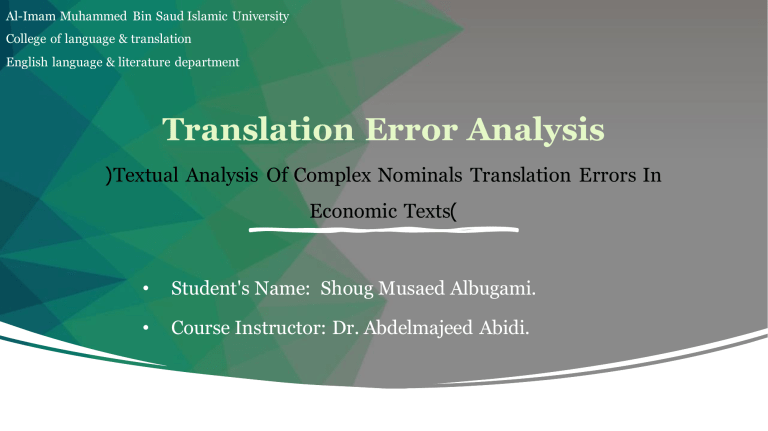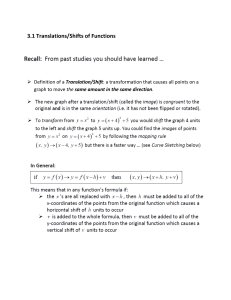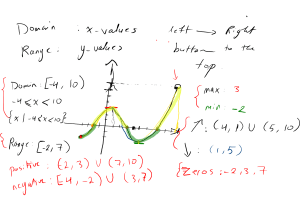
Al-Imam Muhammed Bin Saud Islamic University College of language & translation English language & literature department Translation Error Analysis (Textual Analysis Of Complex Nominals Translation Errors In Economic Texts) • Student's Name: Shoug Musaed Albugami. • Course Instructor: Dr. Abdelmajeed Abidi. Table of content Objectives of the study & hypothesis Methodology Results of the analysis Analysis of Translation Errors Conclusions and Recommendations 1.Objectives 1) to investigate the prevalence of complex nominals in economic discourse represented via the selected business news texts. 2) to shed some light on the most common translation errors made by 2nd year students in the Department of Translation in rendering complex nominals into Arabic. 3) to detect the possible causes behind such translation errors and suggest some translation tips which might sound helpful to the students of translation to find the most suitable translation equivalent. ➢It is hypothesized that many different errors will arise as a result of translating complex nominals as precisely as possible from English business news texts into Arabic. 2.methodology The first part of the study is concerned with investigating the extent to which complex nominals are utilized in the economic texts under scrutiny and the various possible categories of nominalization involved. The second part points out the distribution of translation errors made by the students in their endeavor to render complex nominals into arabic within the specific categories. 2.methodology seven economic texts collected from the 2nd year students’ examination papers have been selected. The range of the length of the texts is between 142 to 163 words, with the total number of words reaching 1,062. Each text has been translated by ten students, making the total number of students 70. The corpus consisted of 159 complex nominals divided into seven categories depending on the number of elements in each category. An example of each category is shown in table one: 3. Results of the analysis • One hundred and fifty-nine occurrences of complex nominals have been detected in the analysis of the selected economic texts. Table two shows that the number of complex nominals occurrences recorded variation in the seven different categories. 3. Results of the analysis Two-term characterized nominals by is being highly productive and can have versatile forms, different grammatical combinations as can shown in this table: be 4. Analysis of Translation Errors A careful analysis has been carried out on the seven categories of complex nominals in the seven selected texts to arrive at the most common translation errors made by the students. It has been found that these translation errors can be divided into five major types: 4.1 the lexico–semantic errors The lexico–semantic errors found in the analysis were classified into two groups depending on the types of errors. The first group was concerned with common and specialized vocabulary, the second with proper names. 4.1.1 Common and Specialized Vocabulary Economic texts are characterized by utilizing common nouns in two ways: • Firstly, these words are used to denote common vocabulary such as (work, jobs, prices, crisis, goods, data, services). It is expected that such words will not cause serious problems in translation. However, many translation errors were found in which the participant students were unable to give the correct equivalents of such common vocabulary. 4.1.1 Common and Specialized Vocabulary Many participant students used words with opposite meanings. Such being the case, the intended meaning of the original word will be distorted: 4.1.1 Common and Specialized Vocabulary Secondly, many common nouns are employed to denote specialized vocabulary which is peculiar to economic discourse such as (recession, quarter, contraction, stagnation, slump, inflation, interest rates, pound, package, real estate, shrinkage, boom). Here, many difficulties are expected to be encountered by the participant students if they were unfamiliar with such specialized vocabulary, hence, they may fail to choose the adequate terminology or use the equivalents that go in line with the stylistic register of the original text. 4.1.1 Common and Specialized Vocabulary • Many translation errors listed earlier prove that the participant students were unaware of the fact that the words which are used to denote common meanings in everyday language will earn specialized meanings when used in technical discourse such as the economic texts. • Another cause for the translation errors can be attributed to the students’ ignorance of the cultural differences manifested via some economic terms. • It is very important to determine the appropriate cultural context of the specific economic term to arrive at the most suitable equivalent. 4.1.2 Proper Names The analysis revealed that proper names constitute a very essential element in many complex nominals, as they are used to refer to names of countries, nationalities, banks, agencies, offices or authorities, and organizations. 4.2 omission The analysis has revealed that many students made unacceptable and unjustifiable translation errors when resorting to omission, whether wholly or partially. 4.3 Grammatical Errors They were divided into four sub-types: • Number – Related Errors: An early estimate (Text no. 1) was translated into تقديرات مبكرة The government’s priority (Text no. 2) was wrongly rendered as أولوايت احلكومة • Non– Compliance with Target Language Rules: Seven years of economic growth (Text no. 1) was rendered as س بعة س نوات من المنو الاقتصادي Five years of steady growth. (Text no. 4). was translated into الخمس سنوات من النمو الثابت 4.3 Grammatical Errors • Case-Related Errors: Some analysts are hoping (Text no. 4) was translated into بعض احملللون • Transposition: The recession (Text no. 6). Here, a definite article is used, and it has undergone a process of transposition by being changed into a demonstrative when translated: هذا الركود 4.4 Misreading 4.5 Confusion Instead of giving a single suitable translation equivalent, some students, who lacked self-confidence, provided target text readers with alternative translation equivalents. Conclusions and Recommendations • The analysis carried out in the first part of the study revealed that complex nominalization constituted a very significant phenomenon in the selected economic texts. Complex nominals are utilized to enrich the economic texts. The study came up with seven categories of complex nominals depending on the number of items in each category. • The second part was concerned with investigating the most prominent translation errors made by the participant students in rendering those complex nominals into Arabic. ➢The researcher concluded that two factors play a vital role in the process of translating complex nominals: their degree of complexity and how experienced the translator is. references Khalil, G. S. (2020). Textual Analysis of Complex Nominals Translation Errors in Economic Texts. Journal of the College of Education for Women, 31(3), 15-38.



